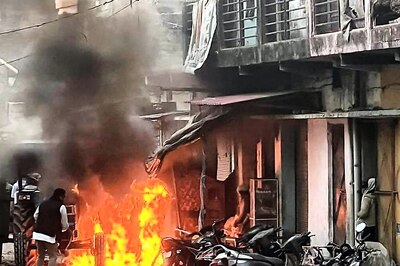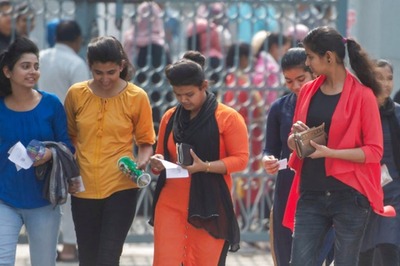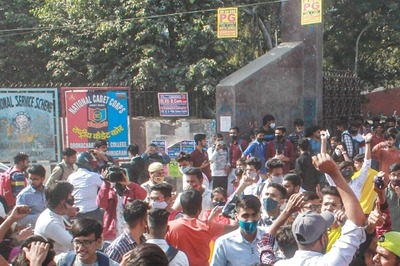
views
As the Marathwada region in Maharashtra continues to crack amid severe water crisis, residents of a small village in Beed district are fighting to save every drop instead of migrating out.
Funding their water conservation mission is the government compensation they received in lieu of crop damage after a hailstorm in 2016. And leading the fight is a 43-year-old farmer, Siddheshwar Kale.
Kale, a resident of Pokhari, which is around 40 km from Beed district, took it upon himself to merge the efforts of villagers and farmers into one big movement for water conservation.
“We did not run away. We decided to fight,” Kale told News18.com.
Kale and the other volunteers covered around 300 hectares of land after the villagers unanimously decided to use the crop damage compensation to fund the water conservation efforts.
“Our village received compensation of around Rs 11 lakh this year. Together, we decided to use these funds for the water conservation work," Kale added.
Beed is one of the parched districts in Maharashtra which has faced perennial drought for years. This year’s drought is one of the worst Marathwada, or even Maharashtra, has ever seen. The state government has deployed 939 tankers in Beed alone to supply water to drought-hit villages, with ground water depletion complicating the crisis.
Four Pokhari residents apart from Kale -- Gokarna Karande, Vandana Bongane, Aruna Wadekar and Ganesh Danne – were trained in water conservation by the Paani Foundation. Kale and his team then roped in volunteers to dig trenches on the hills around the village to recharge groundwater.
They conducted a series of meetings to convince villagers that water conservation will benefit everybody and ultimately increase farming incomes. Around 450 of 600 farmers agreed to donate their share in the crop compensation towards Kale’s efforts.
The village also passed a resolution that those employed outside the village would contribute financially since it was not possible for them to be present physically. Similarly, government servants were asked to pay Rs 5,000 per head while private employees paid Rs 2,500 per person.
A visit to Marathwada revealed that villages around Pokhari undertook similar efforts. The state government has also taken measures like deployment of water tankers and setting up of fodder camps for livestock.
Beed is infamous not only for drought, but also for farmer suicides. The district has not received decent rainfall for last six years, the last two being the worst. The irregular rainfall pattern has disrupted the crop cycle and agricultural business. This has resulted in migration of thousands of people to western Maharashtra in search of livelihood.
"Once we were done with the fund collection, we began planning for shramdaan (voluntary labour). We bought equipment worth Rs 1 lakh. The rest was used to buy machinery deployed for river dipping and for the stretches where manual labour isn’t possible," explained Kale.
“Around 300 to 400 people would work daily. Some of the people were a bit lazy, but we ignored them and continued our efforts,” he added.
Both the men and women would start work at around 7 am in the morning and continue till 11 am and 60-70 boys would work at night too, said Karande, another flag-bearer of this movement.
Sakharam Umathe, who guided his reporter around the hills where the trenching was done, said tankers were the only source of water for the village since Diwali.
The work began on April 8 after a month of planning and went on for the next 50 days, ending on May 28.
"We were unaware of the technicalities in the work, but just one thing that was driving all of us was to resolve the perennial water crisis. And, that was enough to get everybody moving. Everybody has suffered due to it, so all of us united easily on this one point,” said Umathe.
“All of us enjoyed the work. We would assign tasks on WhatsApp every day. Each day people would be given charge of bringing breakfast, lunch and dinner for those at work. Everybody contributed happily,” Umathe added.
"Sometimes people would leave within an hour or so, but we did not force anybody to stay. We had completely left it upon the person whether he or she wanted to work. Almost everybody contributed except a very few. But exceptions exist everywhere."
Susha Mahadev Kale, a septuagenarian, is confident that these efforts will fructify, no matter what. "We put all our efforts and are now hoping for the end of this vicious cycle of water crisis. After all, hope is eternal,” she said.
The energy of the adults also attracted the young to join in. Nine-year-old Kartik was eager to tell this reporter how he pitched in. "I would hop onto the tractor that took everybody to the hills. They (the adults) would hold the ropes and I, along with some other friends, marked the area with ‘fakki’, a white powder used for the marking."
Together, the villagers dug up trenches totalling 9,250 cubic metre to recharge ground water.
The schedule was made in a way that no one missed the arrival of water tankers at their home. “We would coordinate the timings in such a way that all of the families were at home when the water tanker reached their place. It ensured that everybody got their share of water daily,” said Umathe.
At the end of this reporter’s discussion with the villagers, the pitter-patter of raindrops on the tin roof brought smiles to everyone’s faces. After all, this was the moment they all had been waiting for.




















Comments
0 comment